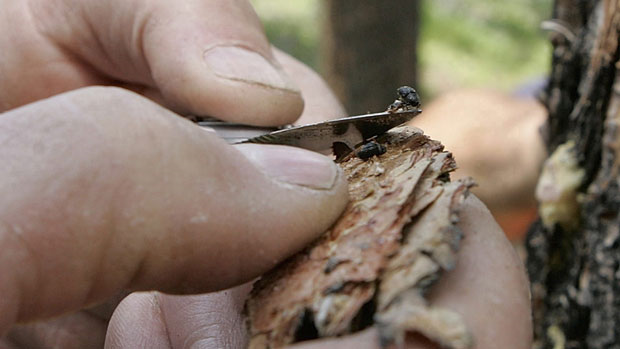Beetles to blame for Colorado fires? Blame climate change instead
By Alan Boyle, Science Editor
25 June 2013 (NBC News) – Tiny, winged bark beetles have been the ecological bad guys of the West for more than a decade, and rightfully so. They’ve killed off millions of acres’ worth of trees in Colorado. Now all those dead trees are feeding the flames across tens of thousands of acres in the southern part of the state. The West Fork Complex fire raging through southwest Colorado has already burned through more than 75,000 acres, including wide stretches of tinder-dry trees hit by beetle damage. With 600 people evacuated from homes, and nearly 900 firefighters on the scene, it is considered to be the worst fire to hit the Rio Grande National Forest. Fire crews don’t expect to make much progress on containing the inferno — actually three lightning-sparked blazes that have joined together — until they get some rain and cooler temperatures. That’s a grim outlook, made grimmer by the droughts and summer heat that scientists have linked to global climate change. Are the beetles to blame for wilder wildfires? Not long ago, experts would have said yes. But more recent research suggests that the connection between Colorado’s beetle infestation and the vulnerability to wildfires is more complex than that.
“The culprit here is the unusual weather conditions, which might become the new norm with climate change,” said Jesse Logan, a retired U.S. Forest Service researcher who has spent decades studying the mountain pine beetle’s effect on Western forests.
Drought conditions have persisted for months across southern Colorado and other Western regions, and the Forest Service says Colorado hasn’t been experiencing winter temperatures cold enough to trigger significant insect mortality. Drought and warmer winters contribute to the pine beetles’ advance, while drought and the hotter summer weather contribute to wildfires. The result? Conditions that favor the beetles as well as the blazes. Logan has seen this before — in 1988, when wildfires swept over more than a million acres in and around Yellowstone National Park. “Independent of what the beetle had done in certain areas of Yellowstone, the whole thing went up in flames,” he told NBC News. “You can point your finger in various directions. It might be the mountain pine beetles, or it might be lack of response to a lightning strike. But really what was driving that was unusually dry weather conditions, and that’s what’s happening in Colorado.” Both the wildfires and the beetle outbreak can be considered effects of climate change. […] The impact of all that forest damage on fire risk is a subject of scientific debate. One recent study, published in the journal PLOS ONE, reported that the fire risk appeared to be elevated in infested forests. A different study, published in Ecological Monographs, said the risk was reduced. This week’s West Fork Fire in Colorado was stoked by trees killed off by spruce beetles, a species related to the mountain pine beetle. However, a study in the journal Ecoscience said spruce beetle infestation should reduce vulnerability to extreme fires. The only consensus is that it depends on the situation. “There could be cases where a bad beetle outbreak could have a big effect, or there could be cases where it would have little effect or almost no effect,” said Chad Hoffman, a professor of fire science at Colorado State University. If a beetle-killed tree stands long enough to lose its highly flammable pine needles, it becomes less prone to catch fire. And when the dead tree falls to the forest floor, that increases the gap between surviving trees, making it more difficult for a blaze to jump from the crown of one tree to the next. However, that gap could let gusts of winds blow through more easily, whipping up a forest fire once it does get started. [more]
Beetles to blame for Colorado’s fires? Blame climate change instead
